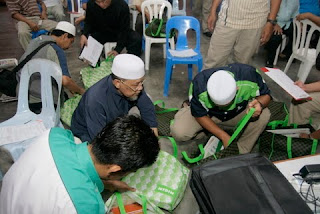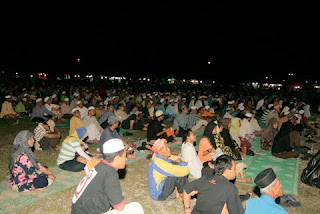 Christian Fraser describes the scene of the air strike in which Saif al-Arab Gaddafi is said to have died.
Christian Fraser describes the scene of the air strike in which Saif al-Arab Gaddafi is said to have died.
A Nato air strike in Tripoli has killed the son of Col Muammar Gaddafi, a Libyan government spokesman has said.
Saif al-Arab and three of Col Gaddafi's grandchildren died at a villa in the Bab al-Aziziya compound, he said.
The Libyan leader himself was there at the time but was unharmed, he added. Nato said it had hit a military target but denied targeting individuals.
Gaddafi supporters rallied outside Western diplomatic missions in Tripoli, reportedly causing some damage.
The UK Foreign Office said it was investigating reports that the residence of its ambassador had been "destroyed". The UK has withdrawn diplomats from Tripoli.
There were also demonstrations outside the Italian and US missions, and the UN building said its offices were looted.
Earlier on Sunday, Nato acknowledged that there had been a strike in Tripoli late on Saturday.
A spokesman, Lt Gen Charles Bouchard, said a "command-and-control" building had been hit, and that all targets for Nato attacks were "military in nature".
He added that he was aware of reports that members of Col Gaddafi's family had been killed, but made no further comment.
The BBC's Christian Fraser in Tripoli says that unusually the alliance issued its statement within hours of the strike, well aware of the political implications.
China and Russia within the Security Council have concerns that the alliance has gone beyond the mandate of the UN resolution authorising "all necessary measures" to protect civilians.
But UK Prime Minister David Cameron said Nato's targeting policy was "in line with the UN resolution".
"It is about preventing a loss of civilian life by targeting Gaddafi's war-making machine, so that is obviously tanks and guns, rocket launchers, but also command and control," he told the BBC.
'Direct operation'
Journalists taken to the site of the air strike said the building was extensively damaged and one unexploded bomb remained at the site.
Saif al-Arab, who had a lower profile than his brother Saif al-Islam, had been studying in Germany and returned to Libya recently.
Government spokesman Moussa Ibrahim said: "The attack resulted in the martyrdom of brother Saif al-Arab Muammar Gaddafi, 29 years old, and three of the leader's grandchildren.
"The leader with his wife was there in the house with other friends and relatives. The leader himself is in good health - he wasn't harmed." Col Gaddafi's wife was also unharmed, he said.
"This was a direct operation to assassinate the leader of this country," the spokesman added.
There has been no independent confirmation of the deaths.
Government spokesman Moussa Ibrahim: "Direct operation to assassinate the leader"
Libyan rebels began a campaign in mid-February to end more than four decades of rule by Col Gaddafi. Since last month they have been aided by an international coalition acting on a UN mandate.
Mr Moussa said the attack was against international law.
"How is this helping in the protection of civilians? Mr Saif al-Arab was a civilian, a student," he said. "He was playing and talking to his father and mother and his nieces and nephews and other visitors when he was attacked and killed."
An adopted daughter of Col Gaddafi's was killed in 1986 by a US air strike launched in response to alleged Libyan involvement in a Berlin bombing targeting US military personnel.
Mr Ibrahim accused the international coalition conducting strikes over Libya of not wanting peace.
"We have again and again declared that we are ready for negotiation, ready for road maps for peace, ready for political transitional periods, ready for elections, ready for a referendum.
"The West does not care to test our statements. They only care to rob us of our freedom, our wealth, which is oil, and our right to decide our future as Libyans."
Gunfire rang out in celebration in the eastern rebel stronghold of Benghazi following the reports that Saif al-Arab Gaddafi had been killed.
Several air strikes against Col Gaddafi's sprawling Bab al-Aziziya compound have been reported recently.
Earlier this week, US Defence Secretary Robert Gates told reporters that Libyan government command and control centres were "legitimate" targets, although he said Nato was not targeting Col Gaddafi directly.
On Saturday, Nato officials said the alliance would not consider talks until government forces stopped attacks on civilians.
The vice-chairman of the rebel Transitional National Council also rejected the offer of negotiations.
He said the Libyan leader had "offered ceasefires only to continue violating basic human rights, international humanitarian law, and the safety and security of Libya and the entire region".






















